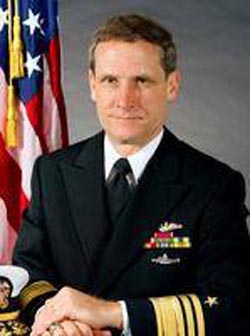
This is a phone interview recorded on May 29, 2014 with Vice Admiral (Ret) Daniel Cooper who grew up in East Liverpool before attending the Naval Academy. VADM Cooper ELHS Class of 52 was inducted into the ELHS Athletic HOF.
ELHS: How are you?
ADM COOPER: Fine thank you
ELHS: The East Liverpool historical society has a website online. There is a section on that website that gives a local history of East Liverpool, itís people and our local military heritage. There is also a privately owned Facebook site honoring our local military heritage. The purpose of this interview to put it on those sites. The question mostly come from members of that Facebook site. If youíre okay with this we can begin.
ADM COOPER: Okay.
ELHS: Do you recall anything about the 3rd floor at central building? What it looked like, how was laid out?
ADM COOPER: I do not remember. I donít recall ever being up there. All my classes that I had run the 1st & 2nd floor in central.
ELHS: Did you ever meet or know Rear Adm. John D. Bulkeley?
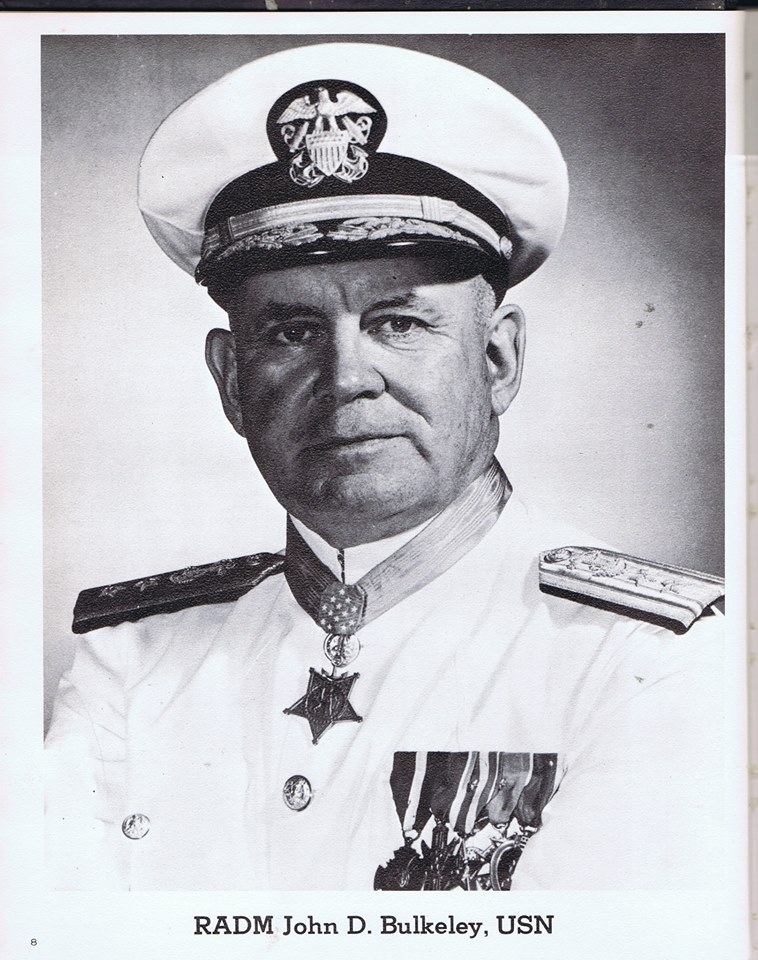
ADM COOPER: Yes.
ELHS. I made a 6 month long Mediterranean cruise, from September 1966 to March 1967. He was COMDRUDESFLOT EIGHT with his flag on the Columbus. While I never physically met him, I did see him a number of times during that cruise. I had seen the movie about him and his men ďThey Were ExpendableĒ with John Wayne playing the role of his Lieutenant, a number of times while growing up and was aware he had been awarded the Congressional Medal of Honor. I thought it was pretty nice serving on the same ship with him.
ADM COOPER: John Bulkeley was a legend for his PT boat work. I met him in 1968 or 69 when he was the commanding officer of our naval training base down in Guantanamo Bay, Cuba It was he, in fact, who cut off the water the base had supplied the locals at Guantanamo City. So he cut off the water when things went to pot down there. Then he came back and he was in charge of the Navy INSURV which is a group of people who go around and inspect ships at various ages in their lifetime to see how they are holding up or how they were built and so on. So that was his last job. Finally, I saw him on occasion down at the Chapel the Washington Navy Yard where he would go every Sunday and participate in the church services down there.
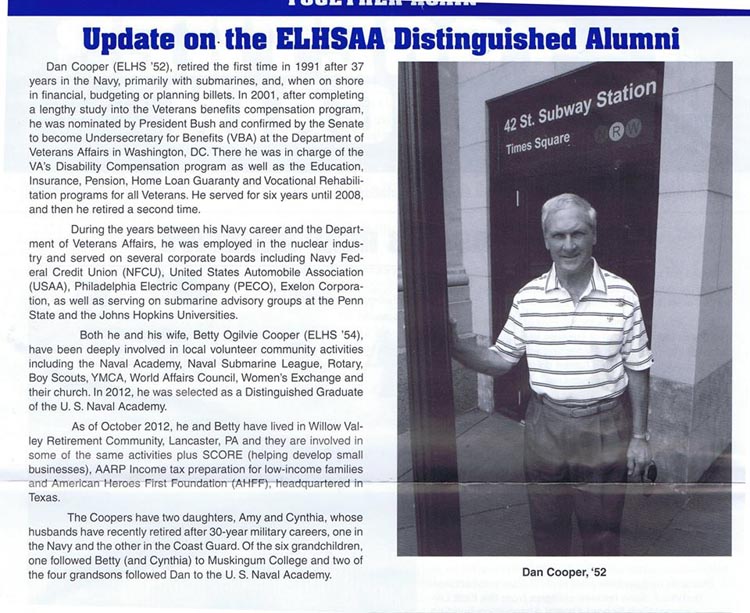
ELHS: This is a question by Kathy Jones-Collins USAF Lt. Col. (Ret) She asks what are your thoughts on the current VA scandal?
ADM COOPER: Well, I donít like to express too many thoughts. I would say to you that Eric Shinseki is a fine person and people have to remember he is in charge and if they want to fire him, so be it, but youíre going to bring in somebody else who does not have a clue how the VA operates. So youíre not going to help yourself at least for the next 2 years if you fire General Shinseki just to bring in somebody new. I think it is a very unfortunate circumstance. Itís a fact that several people have absolutely lied who were keeping records or were in charge of the record-keeping and those people ought to be removed immediately and kicked out of the VA, fired, literally fired. Youíve got to jump in, seek out the core of the thought process that says that type of thing is acceptable. On the other hand they need to take a look to see if the goal is reasonable and if they have the number of doctors and psychologists and psychiatrists and so on to be able to take care of the number of veterans that they have. Maybe the goal itself is unreasonable and if the goal isnít reasonable well then get more people to help. So people have to understand it is a very complicated process. It is a large bureaucracy and bureaucracy in of itself is not bad. Bureaucracy has to be around when you have a large organization but in fact there are a lot of things that need to be done and nobody understands the total process and it is complicated. Those are my major thoughts.
ELHS: From the same person as the previous question. If you had the opportunity to fix the VA what would you do to secure good care of our veterans?
ADM DOOPER: Let me just explain to you. I went to the VA and I was there, you probably know, for about seven years. I was asked to come down and do a study. Nothing was said about taking the job. They wanted me to do a study on the disabilities side. So I did a four to six month study then they asked me if I would take the job and I said no. After about 3 weeks, they finally convinced me that I should take the job as the undersecretary, but by that time I had had 6 months to look at all the major problems that they had and at least understood the problems although I didnít have all the answers. But you donít have many opportunities to give somebody that type of exposure or training prior to giving them the responsibility of doing the large jobs they have down there..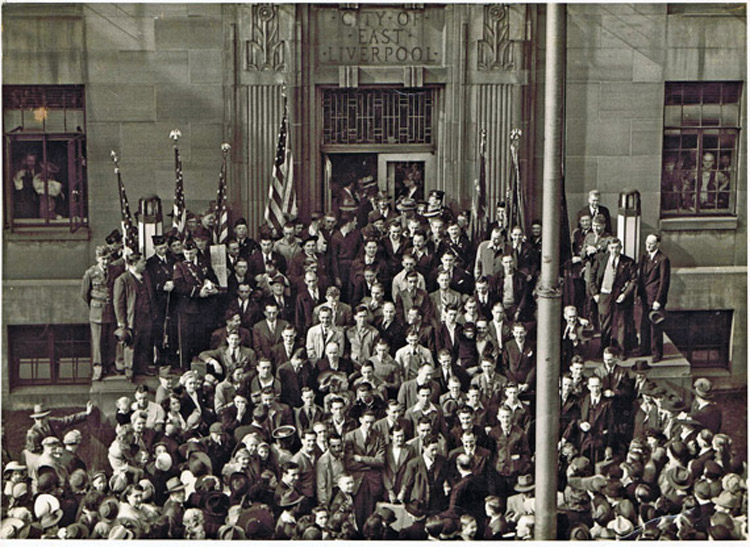
Mass swearing into the armed forces in downtown, Apr 25, 1942.
ELHS. Again the same person asks, how can we instill patriotism in our young people today?
ADM COOPER: Iím in an area right now in Pennsylvania, about 60 to 70 miles west of Philadelphia in Lancaster, Pennsylvania and we lived in Reading Pennsylvania for 20 years prior to coming to the retirement home in Lancaster. Let me tell you something. There is a patriotic feeling in this particular area and a lot of it is due to veterans. They will have the veterans visit high schools. I participated; I gave 2 speeches on Memorial Day up in Reading. So the core of patriotism is there. You need to meet with veterans and let the veterans come into the classes of young kids and talk about the things they did and the things they saw and inculcate in the kids why you have a nation like we have and why we have the principles we have for our nation and what this freedom means. Does that do it everywhere? No, no. Our country is completely different across this country, but the fact is, that is a good start and Iíve seen it working in this particular area.
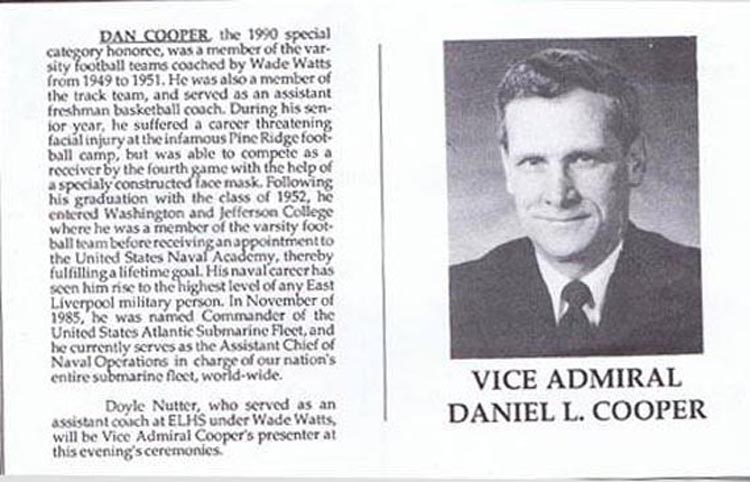
ELHS. Kathyís last question is what are some your best memories of East Liverpool?
ADM COOPER: Well the kids I was with when I was in high school. Frank Dawsonís of the world, so others in our class, Pete Wooley, Robbie Niblock, Bud Strobel, Dick Carson. The friends I made. I didnít name any females but there were some really nice girls there and we just had a good bunch of people. I like the aspect of playing sports because there you met a full variety of people not just those that happen to live in your particular neighborhood, but people from all around town whether it was downtown, or East End or West End or North Side. So you met a wide variety of people that you enjoyed seeing even when you went back to some of the alumni reunions. What I remember more than anything are the people.
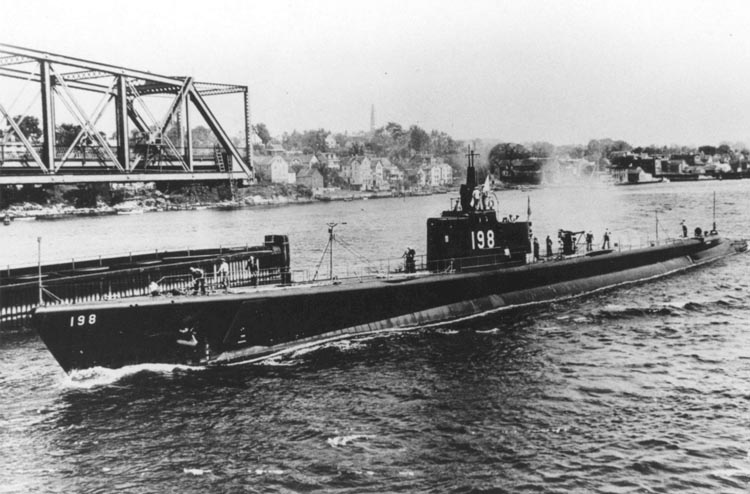
ELHS. The next set of questions are from Paul Hobbs who was a submarine sailor. How are women going to impact crews of todayís submarines?
ADM COOPER: That is a question no one can answer. They have been doing it now for 3 years starting with officers, 2 or 3 officers at a time and of course when you first start something like this you pick the very best people you can to be the originators and so far they have done extremely well. Pretty soon you get down to the average and once in a while you will have a problem. But the primary inculcator on any ship is the commanding officer. If the commanding officer properly inculcates the crew the proper ways to behave and professionalism of the ship they are on, then it will work fine.
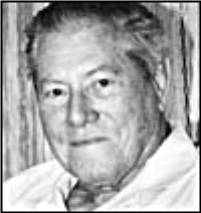
ELHS. Did you ever get to serve with or meet Vice Adm. Arnold Schade who, as lieutenant commander Schade, took command of the submarine USS Growler on that fateful heroic night, 7 February 1943, when mortally wounded commander Howard Gilmore ordered Schade, the XO, to ďTake Her DownĒ?
ADM COOPER: I never served with him but he was commander of the submarine force Atlantic fleet, a job which I held about 20 years later. Arnie Schade was a very well-known submariner. I got to meet him off and on when he came to Washington when I was a junior officer in Washington. That is one of the best-known stories in the history of the submarine force. I have seen the movie on Growler and I met Schade. He was an outstanding Naval officer and submariner. I have seen movie and it was a very moving thing the skipper did answer very heroic thing that Arnie Schade did in taking the command and doing it.
ADDITIONAL INFORMATION
http://www.findagrave.com/cgi-bin/fg.cgi?page=gr&GRid=14868706</p>
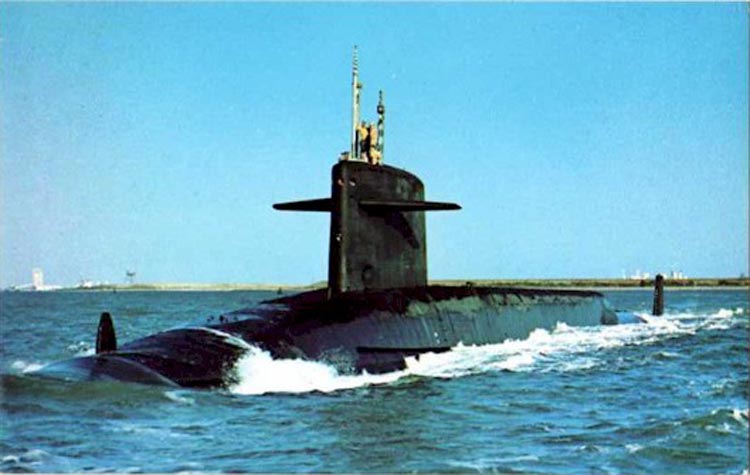
ELHS. Another by Paul. Is our Department of Defense paying attention to the Chinese buildup of nuclear ballistic missile submarines?
ADM COOPER: Yes.
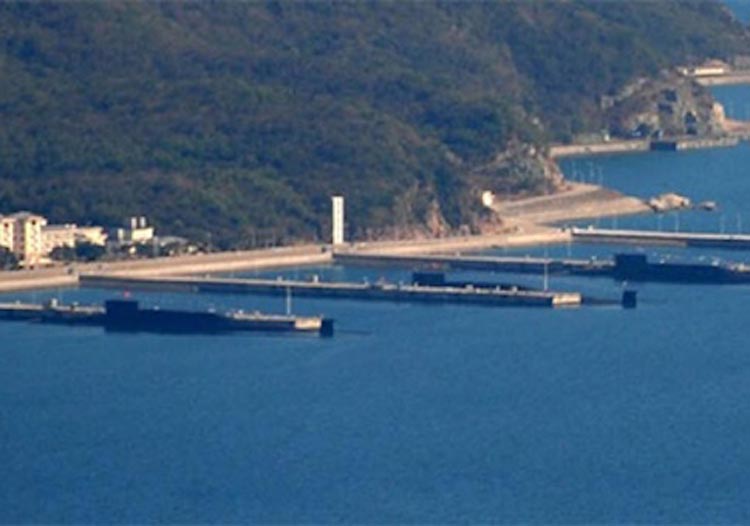
Three-Chinese-Type-094-nuclear-missile-submarines-recently-in-the-South-China-Sea
ELHS. The last question from Paul. Is the caliber of men entering the submarine service as motivated and dedicated as those with whom I served aboard the USS Thomas Jefferson SSBN 618 in the mid to late 60s. I have never experienced that level camaraderie since.
ADM COOPER: Yes, yes. We still have very specific requirements for kids coming in. Very strong training, very strong motivational type things. Again, any submarine success in whatever they do is do primarily to the commanding officer. He is the one who sets the tone. He is the one who makes sure everybody understands what needs to be done and he is the one primarily who motivates them to do the right thing.
ELHS. These questions are from Nancy Durst Adkins, a former USN corpsman. She is also the daughter of Don Duffy, Class of 1941 and a member of the ELHS Athletic HOF like yourself. She asks if submarine duty was a particular favorite of yours.
ADM COOPER: Oh absolutely. And the primary reason is all our submarines were well-built, they were in a strong program, particularly on the nuclear side. Adm. Rickover did a superb job of ensuring they were safe, that the nuclear procedures were properly followed but the primary convolute of submarine duty is the quality of the individual who was on the submarine. If someone is a bum and doesnít want to do the job, you kick them off. So the quality of the individual you have both as far as motivation, intelligence and desire, could not be higher than it is in the average person on the nuclear submarine.
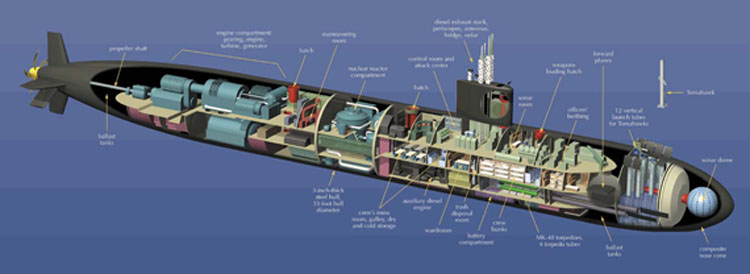
ELHS: Did you aspire to submarine duty from the outset of your career, or did circumstances just lead you to become commander the Atlantic fleet?
ADM COOPER: I aspired to go to submarine but when I graduated from the academy who had to go on a surface ship for at least one year before you could even go to submarine school. I was very fortunate in that I got to serve on a surface ship, amphibious ship so I served with Marines for a year or year and a half, then I went to sub school, then when I went on to a diesel submarine. I was on a diesel sub for 3 years then I was sent to Harvard per year and then I went into the nuclear program. I was able to see the gradation of individuals on each of the classes of ships and thatís the reason I am so impressed by those men I saw on board the submarines.

ELHS: Nancy asks did you enjoy your time at the Naval Academy was it all you hoped it would be?
ADM COOPER: Yes.
ELHS: Would you change anything about the Academy?
ADM COOPER: The Naval Academy has changed dramatically. Remember that was 56 years ago. So the Naval Academy has changed dramatically. It was what I expected and I certainly got a lot out of it. I go back frequently. Matter of fact, I was at the graduation last Friday and have been involved with many things at the Academy so I would say then it was what I expected. I would say today is even better than people would expect. The quality of the mid-shipment you get is very high. Itís inspiring just to go on the grounds. I took a group down to the Academy a month or so ago, a group of 60 people and it was one of the best trips they had ever had. So the Academy is doing well, itís producing good quality young men and women for the service and so to answer the question is first yes, and secondly it is still doing so well.
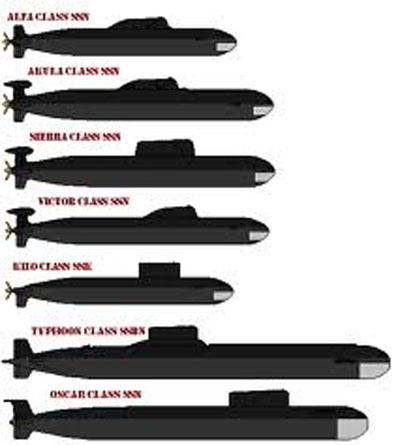
ELHS: The next questions are from Dave Blazer. What changes have you seen in submarines during your career, and which ones are most wide-ranging? The nuclear of course would be big.
ADM COOPER: Yes, thatís obviously the main one. But then you have your improvements and weapons. You went from a steam-driven torpedo to a torpedo that is wire-guided so that what the wire stays and you can change the direction of torpedo as it goes toward whatever target. You have the missile. When the ballistic missile first came, it could go about 1200 miles on and it would land in an area about the size of East Liverpool and Wellsville combined. But , today you have a weapon that goes in excess of 5000 miles and it will land in a place, in a target the size of Patterson field. So there are two major things. You also have the capability of making your own water, of making your own air and you change the design of the submarine hull so you now have a submarine that is a real submersible. In World War II, you had submarines that were surface ships that could submerge and they could go faster on the surface then when they were submerged. You now have a submarine with a cigar shaped hull that goes faster when it is submerged and is much slower when it is on the surface . Of course itís never on the surface . The main limitation on the time a submarine can stay submerged is the amount of food you can carry because you make everything else. So the changes in every aspect of submarine living are dramatic.
ELHS: What is it like to be on the submarine for extended periods of time?
ADMCOOPER: Oh the fact is, people talk to me about claustrophobia. If you have claustrophobia will have had the first minute that you go down in the hull and you will come right back up. So being submerged one day or 100 days isnít all that different. You get used to being on board, you get used to the schedule, you get used to what you do, what you have to do, when you have to do it. There is not a particular stress by virtue of the fact that youíre out there for 30 days, 40 days, 50 days or plus. That in itself is not a particular aspect.
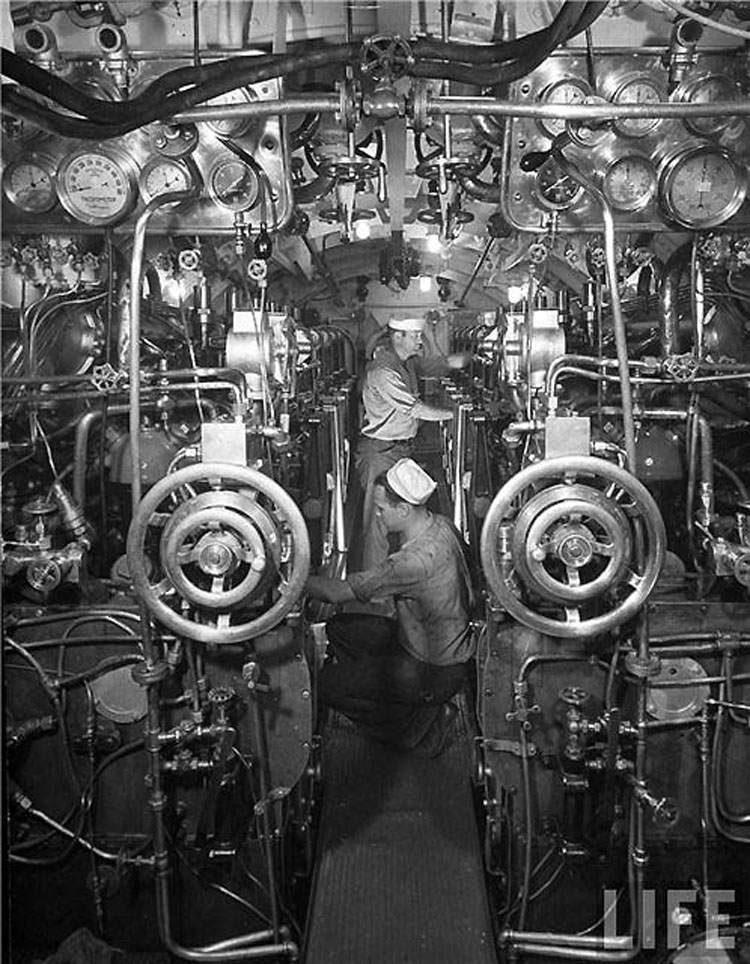
ELHS: Of all your duty station to assignments which one you have the fondest memories of and why?
ADM COOPER: My time on my command on my submarine and the time I was in command of the submarine force the Atlantic. Those are 2 in particular. If I sit down and thought for a very long time I could come up with particular instances that were pretty interesting but when you talk about that you sort of have to develop the story and try to describe it in about a minute and a half is virtually impossible. So we have been extremely, my wife and I have been extremely fortunate in the various places we have lived, the things that have happened, overall. We have lived in Charleston South Carolina twice, and both were daughters were born in Charleston. But the things we did on submarines, things our family did, throughout the whole career, all of those things were interesting. Was every day great? No! But overall, it was a pretty unique and wonderful time.
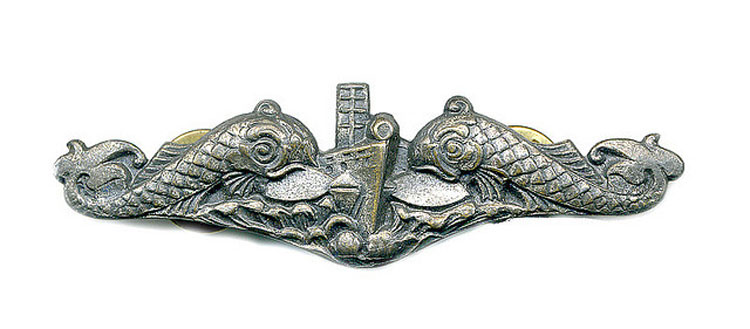
ELHS: Last question. I donít want take up too much of your time. Of all the metals, awards, qualification badges, or devices you have earned and/or received which are the most meaningful to you and why?
ADM COOPER: I think that 99% of the submariners would say to you that the submarine Dolphins. When you qualify and submarines and you get your Dolphins and wear those, why that is the most significant.
ELHS: I thank you for your time.
ADM COOPER:. While youíre certainly welcome and when you talk to Frank tell him I said hello.
ELHS: I will and if you have access to a computer any time check out the East Liverpool Historical Society website.
ADM COOPER: Okay, sure will. Thank you .
ELHS:Thank you and good bye.
ADM COOPER: Good bye.
This site is the property of the East Liverpool Historical Society.
Regular linking, i.e. providing the URL of the East Liverpool Historical Society web site for viewers to click on and be taken to the East Liverpool Historical Society entry portal or to any specific article on the website is legally permitted.
Hyperlinking, or as it is also called framing, without permission is not permitted.
Legally speaking framing is still in a murky area of the law though there have been court cases in which framing has been seen as violation of copyright law. Many cases that were taken to court ended up settling out-of-court with the one doing the framing agreeing to cease framing and to just use a regular link to the other site.
The East Liverpool Historical Society pays fees to keep their site online. A person framing the Society site is effectively presenting the entire East Liverpool Historical Society web site as his own site and doing it at no cost to himself, i.e. stealing the site.
The East Liverpool Historical Society reserves the right to charge such an individual a fee for the use of the Society’s material.